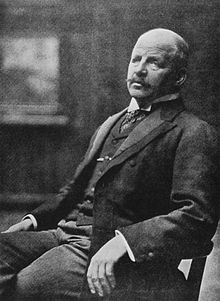Alfred Lichtwark
| Alfred Lichtwark | |
|---|---|

Alfred Lichtwark in 1899. Photograph by Rudolf Dührkoop.
|
|
| Born |
November 14, 1852 Hamburg-Reitbrook, Germany |
| Died | January 13, 1914 (aged 61) Hamburg, Germany |
| Residence | Hamburg, Germany |
| Academic background | |
| Alma mater | Christianeum, Altona, Hamburg, Germany |
| Academic work | |
| Main interests |
Museum education, Art education |
Alfred Lichtwark (November 14, 1852 – January 13, 1914) was a German art historian, museum curator, and art educator in Hamburg. He is one of the founders of museum education and the art education movement.
Alfred Lichtwark was the son of Johann Karl Ernst Lichtwark, a miller who owned the Reitbrook Mill. From his father's first marriage he had three half-siblings. Alfred Lichtwark's mother Johanne Helene Henrietta (née Bach) (1829–1909) was believed to be a direct descendant of the composer Johann Sebastian Bach. Lichtwark had a happy childhood in the countryside with his siblings Hans and Marianne (1857–1930) until 1858, when his father was forced to sell the mill for financial reasons. The family moved to Hamburg, where his father ran an inn which fared poorly, and the family lived in poverty. Lichtwark, who attended the civil school, proved to be very talented and versatile, helping students after school as an assistant teacher. In 1873 he took the Abitur at the Christianeum in Altona. A grant by Justus Brinckmann helped finance his studies in arts and education in Dresden, Leipzig, and Berlin. After finishing his studies he worked at several primary and civil schools in Berlin. Lichtwark was very disenchanted with the educational system that existed at that time in Imperial Germany, which led him to the idea of a new kind of school or pedagogy.
It is unclear why Lichtwark was asked in 1886 whether he wanted to take over as the director of the Kunsthalle Hamburg (an art museum in Hamburg), which was previously managed only by a member of the Senate. He became the first director of the Kunsthalle Hamburg on December 3, 1886, after which he systematically developed its collection. The current collection is still largely based on the foundations set by Lichtwark.
...
Wikipedia
